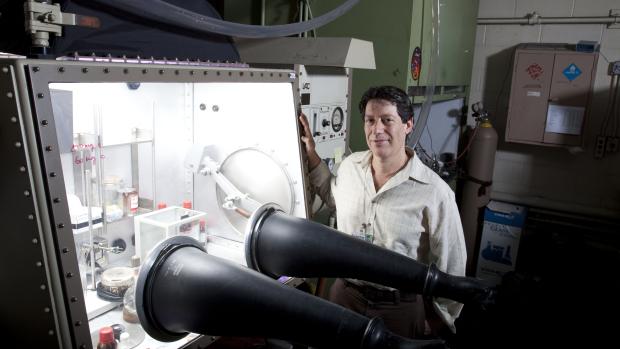New, but Familiar: NYU-Poly Professor Developing Bioplastic That Acts Like Regular Plastic

When people complained en masse that new biodegradable Sun Chips bags were too noisy, enough for the snack’s maker, Frito Lay, to scrap the bags altogether last year, it sent a signal: most consumers expect earth-friendly products to perform like the traditional products they’re used to. Polytechnic Institute of New York University’s Richard Gross is at work to create just such a product for the plastics industry.
The professor of chemical and biological science and partners recently received grants from the National Science Foundation (NSF) to develop an improved, bio-based alternative to petroleum-based plastics that could be used in everything from bottles to garment bags. One of the grants is for $590,000 and will fund research between Gross and PolyNew, a small Colorado-based company that produces nanocomposites. NYU-Poly will coordinate and also collaborate on the project, which is funded through the NSF’s Partnerships for Innovation program, an effort to commercialize academic research by requiring that grantees collaborate with small businesses. The other is for $150,000 and will fund research by Gross’s SyntheZyme startup company.
Both projects will build on a method Gross created for producing a strong, highly ductile bioplastic using yeast. The Journal of the American Chemical Society published Gross’s findings in 2010. His method involves a fairly quick, relatively low-cost way to use engineered yeast to make large quantities of omega-hydroxyfatty acids from fatty acids of plant oils. When strung together, the omega-hydroxyfatty acids form a polymer, or plastic.
“It was a very exciting development in the field, and not just because we created a bioplastic with desirable properties,” says Gross. “The process uses no fossil fuels, and every step is biologically friendly, from fatty acids in plant oils through the end product, which is a versatile, 100 percent biodegradable plastic.”
The polymer from omega-hydroxyfatty acids Gross created will provide tough and flexible new bioplastics. PolyNew will develop natural fibers from cellulose known as cellulose nanowhiskers that will act as a reinforcing agent increasing SyntheZyme’s bioplastic’s rigidity. SyntheZyme has also developed blends of their bioplastics with a commercial bioplastic produced by NatureWorks known as polylactic acid. Various combinations of SyntheZyme’s polymer from omega-hydroxyfatty acids with polylactic acid and cellulose nanowhiskers will lead to the development of a suite of new bioplastics for uses in a wide range of applications including disposable gloves, multilayer food packaging films, produce bags, bottles, fibers in clothing and carpets, and molded plastic articles used as casings for electronic products.
The U.S. Defense Advanced Research Projects Agency (DARPA) tapped Gross’s laboratory at NYU-Poly to develop his original bioplastics. The further development of that work led in part to the formation of SyntheZyme, which is a member of the New York City Accelerator for a Clean and Renewable Economy (NYC ACRE), a new-business accelerator for clean technology and renewable energy companies. NYU-Poly operates NYC ACRE with funding from the New York State Energy Research and Development Authority (NYSERDA) within the Varick Street Incubator, which is a partnership of NYU-Poly, the New York City Economic Development Corporation and Trinity Real Estate.




